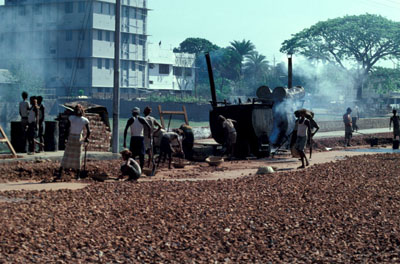Strengthening Natural Resource Revenue Management and Lowering Volatility in Papua New Guinea

Summary
To decrease the negative effects of economic volatility induced by fluctuations in commodity prices and to improve management of natural resource revenues, Papua New Guinea wanted to learn international best practices through exchanges with other developing countries. The World Bank connected Papua New Guinea with Chile and Mongolia to learn how to implement policies and create governance institutions that would safeguard and manage windfall mineral resource savings, achieve long-term fiscal stability, and address acute social and infrastructural needs. Using funding provided by the South-South Experience Exchange Facility, high ranking government officials from Papua New Guinea took part in an International Forum on Sovereign Wealth Funds in China, held videoconferences with Mongolia, and went on a study tour to Chile.
“A great deal came from the Chile visit, from the perspective of all the agencies involved,” said a Papua New Guinea Department of Treasury official. “Being able to physically meet with counterparts gave far more insights into how to develop the SWF, particularly the frameworks and governance structure, the operational rules, and it also provided a lot of help around the administrative process of the SWF.”
Beneficiaries / Participants
Papua New Guinea has rich natural resource deposits, including oil, gold, and copper; these are also the country’s main exports. The government’s macroeconomic management improved considerably during the 2004-2008 commodity boom, which helped the economy cope relatively well with the subsequent global economic crisis. However, like other economies overly reliant on mineral resources, Papua New Guinea suffers from the negative effect of volatile commodity prices. In addition, senior policymakers lacked exposure to global best practices in managing mineral revenues, decreasing commodity-induced economic volatility, and maintaining aggregate fiscal discipline. The country’s windfall savings from mineral resource exports have not been well managed, with over 20 ineffective and insecure trust accounts. Those accounts are denominated in domestic currency—the kina—and have very low interest rates. The fact that commercial banks hold half of the accounts complicates sterilization efforts and leads to net fiscal losses for the government.
Moving forward
The exchange enhanced the support provided by Papua New Guinea’s main development partner, the Government of Australia. The activities coincided with internal reviews of the Australian advisory program, leading Australia to consider a wider range of international experience to solve Papua New Guinea’s policy challenges. Given the significant resources provided by Australia, this change is likely to further improve Papua New Guinea’s natural resource revenue management, while also ensuring the country will benefit from other South-South exchanges in different areas.

 China
China Colombia
Colombia Denmark
Denmark India
India Indonesia
Indonesia Mexico
Mexico Russian Federation
Russian Federation Spain
Spain United Kingdom
United Kingdom